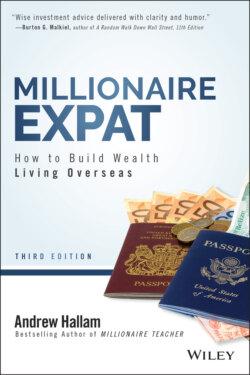Читать книгу Millionaire Expat - Andrew Hallam - Страница 27
Global Investors Bleed by the Same Sword
ОглавлениеNow toss a professional fund manager into the mix—somebody trained to choose the very best stocks for the given fund. Unfortunately, the fund's performance will likely lag the stock market index. Most active funds do. And the actively managed funds that do beat their benchmark indexes over one measured time period usually lag the index during the next time period. That's why buying actively managed funds (especially those with strong recent track records) doesn't make sense. Regardless of the country you choose, actively managed mutual funds sing the same sad song.
Recall why from the previous chapter. Professionally managed money represents nearly all of the money invested in a given market. Consequently, the average money manager's return will equal the return of the market—before fees. Add costs, and we're trying to run up that downward‐heading escalator.
Consider the UK market. According to Morningstar's Global Fund Investor Experience Study, the average mutual fund in Great Britain costs 1.28 percent each year.2 Regardless of the market, the average professionally managed fund will underperform the market's index in equal proportion to the fees charged. Often, the reality is even worse.
Ron Sandler, former chief executive for Lloyds of London, reported a study for The Economist, suggesting that the average actively managed unit trust in Great Britain underperformed the British market index by 2.5 percent each year. Fees contributed to those poor returns.3
You might think that's nothing…a bit like a waiter's tip. But it's more like the tip of an iceberg. Here's an example. A 30‐year‐old investor might have an investment time horizon of 55 years. She would start selling parts of her portfolio once she retires. But she would keep most of the money invested, selling portions of the portfolio each year to cover retirement living costs.
If someone invested £5000 and it averaged 8 percent per year, it would grow to £344,569. But if £5000 averaged 5.5 percent per year, it would grow to just £95,028.
Not all actively managed funds fall behind their benchmark indexes. But most of them do. According to the SPIVA Scorecard, 83.22 percent of US actively managed stock market funds underperformed the broad US stock market index over the 10 years ending December 31, 2020.4
Canadians shouldn't feel smug after seeing these results. Canadians pay the second‐highest investment fees in the world (after the expats who buy offshore pensions). During the 10‐year period ending December 31, 2020, the broad Canadian stock index beat 84.29 percent of actively managed Canadian stock market funds. Canadian mutual fund companies also created funds that focus on US stocks. Over that same time period, 95 percent of Canada's actively managed funds that focus on US stocks underperformed the broad US stock market index.5
Other countries' actively managed funds don't perform any better. Over an investment lifetime, beating a portfolio of index funds with actively managed funds is about as likely as growing a giant third eye.
